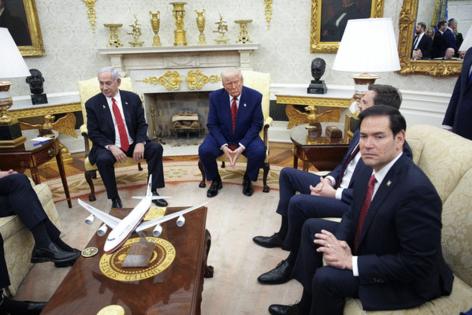Trump won't give Israel a break on tariffs after Netanyahu meeting
Published in News & Features
President Donald Trump Monday refused to ease tariffs on Israel after meeting Prime Minister Benjamin Netanyahu, a disappointing sign that he is unwilling to step down from the escalating trade war that has sent global markets into a nosedive.
Even after Netanyahu vowed to eliminate Israel’s trade deficit with the U.S., Trump told a reporter he doesn’t plan to reduce or scrap the 17% tariff he slapped on the Jewish state as part of a sweeping plan to tax virtually all imports.
“Maybe not,” said Trump when asked about a pause on tariffs, adding that the U.S. already gives massive amounts of aid to the Jewish state. “We are not looking at that.”
The unsuccessful meeting with Netanyahu marked the first face-to-face sit down with a foreign leader since Trump last week unleashed a wave of tariffs against geopolitical rivals and allies alike.
Netanyahu told reporters he vowed to eliminate tariffs on the U.S. and even end the Jewish state’s trade surplus with the U.S. in talks with Trump.
“We will eliminate the trade deficit with the U.S. (because) it’s the right thing to do,” Netanyahu said. “Israel can serve as a model for many countries … to do the same.”
The concessions apparently fell on deaf ears. Trump boasted that dozens of world leaders were scrambling to negotiate on trade after he announced tariffs ranging from 10% to 49% on countries worldwide.
But he didn’t commit to easing or delaying imposition of the import tax on Israel or any other trading partners.
“They’re going to be fair deals (because) this is America First,” he said, referring to his campaign slogan. “We’re going to have fair deals and good deals with these countries or they’re not going to have access to our market.”
With the lack of apparent progress in tariff talks with Netanyahu, market indices seesawed as the two leaders addressed reporters in the White House in the minutes before Wall Street closed mixed after a day of choppy trading.
The White House raised eyebrows by abruptly canceling a planned joint press conference with Netanyahu, perhaps an early signal that Trump did not plan to make any major concessions on tariffs.
Netanyahu and Trump also discussed the war in Gaza and rising tensions with Iran.
Trump said he wants to find a solution to end the Israel-Hamas war and to convince Hamas to free Israeli hostages.
He shrugged off a question about specifics about resuming talks that have collapsed since Israel resumed the war in the Palestinian enclave.
“We’re working on bringing home the hostages,” Trump said.
On Iran, Trump said the U.S. was engaging in “direct talks” with Iran over its nuclear program with “high level” negotiations scheduled for this weekend.
He has declared a two-month deadline to reach a new nuclear deal with Tehran, but the Islamic Republic has so far signaled little interest in talks.
Although Israel is a tiny market for U.S. products, the United States is a key market for Israel.
Much of that trade is for high-tech services, which are not directly affected by the import tariffs, but other key Israeli industries could be affected.
The Manufacturers Association of Israel estimates that the tariffs will cost Israel about $3 billion in exports each year and lead to the loss of 26,000 jobs in industries that include biotechnology, chemicals, plastics and electronics.
_____
©2025 New York Daily News. Visit nydailynews.com. Distributed by Tribune Content Agency, LLC.












Comments